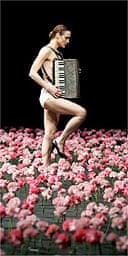It is more than 20 years since Pina Bausch, the German choreographer and director of the Wuppertal Dance Theatre, first created Nelken and unveiled one of the most breathtaking designs in dance history - a stage carpeted with thousands of pink carnations and patrolled by alsation guard dogs. This collision of beauty and nightmare has since become a defining image of her career. And as Nelken gets its long overdue showing in London, it is clear the image has lost none of its power.
The piece, which debuted in 1982, draws on Bausch's childhood in postwar Germany, and there is a kind of period innocence to much of the material, mixed uneasily with references to its immediate brutal past.
These carnations and dogs come charged with a very autobiographical resonance. But Nelken also taps into a much more generalised scenario: the basic pain of being bullied and oppressed. In the work's marathon mix of dance routines, spoken monologues and ritualised games, Bausch's performers run the gamut of children being punished by parents, victims cowed by officials, women abused by men and artists exhausted by the stage.
"You're yawning already," says Lutz Forster at one point, accusingly to the audience, "and my feet are sore."
On this frontline of cruelty the torments are ingenious. A woman is force-fed food she hates; a passport official requires a man to humiliate himself with animal impressions; a group of men in badly fitting frocks are allowed to bunny hop happily among the carnations until they are surrounded, terrifyingly, by security men and four whining guard dogs.
Yet, if all this makes Nelken sound like one long howl of misery, Bausch is also celebrating the fact that the vulnerable and the childlike can have most fun.
Often this piece seems to take place between the cracks in the grown-up world. And while things may look huge and brutal to the men and women of Bausch's imagination, these people are also brilliant at losing themselves in subversive jokes, deluded fantasies, and hopeless romantic gesture. They are hilarious in their stubbornness and their show of energy - so that a squabbling playground game turns into a virtuoso comic riot, and a testily aging danseuse forces us to applaud his ropey turns.
As with much of Bausch's work, you know the alchemy of her imagination has started to function when you find yourself grinning fondly at her dancers, total strangers with whom she has made you feel oddly and tenderly intimate.
Until February 20. Box office: 0870 737 7737
